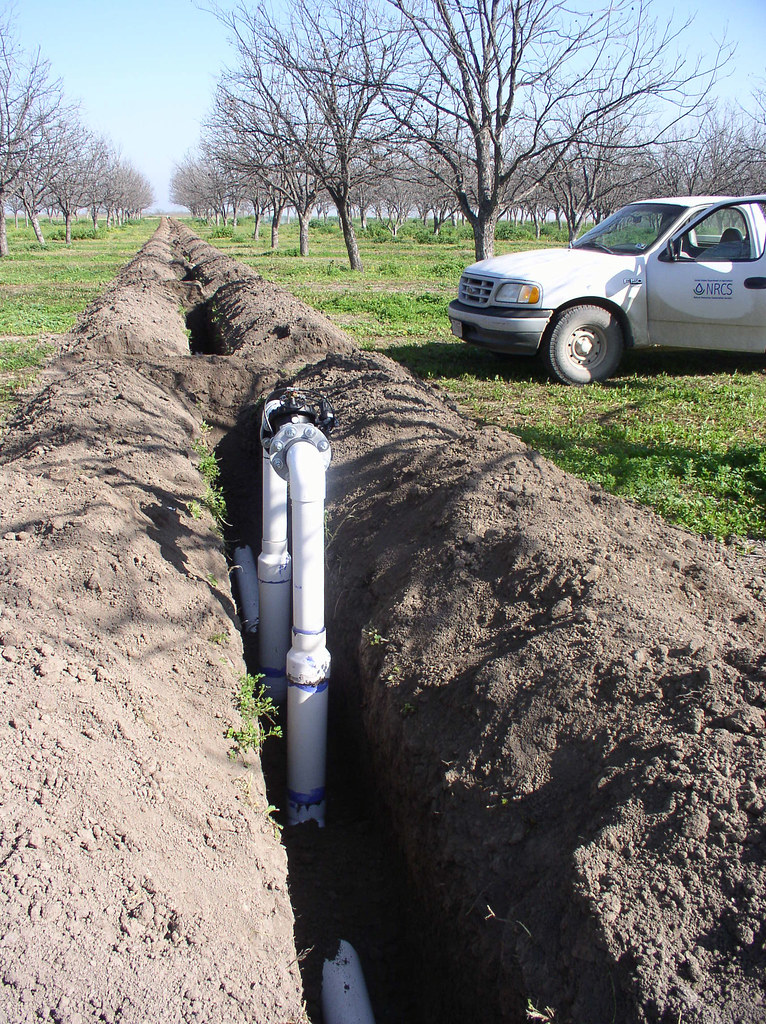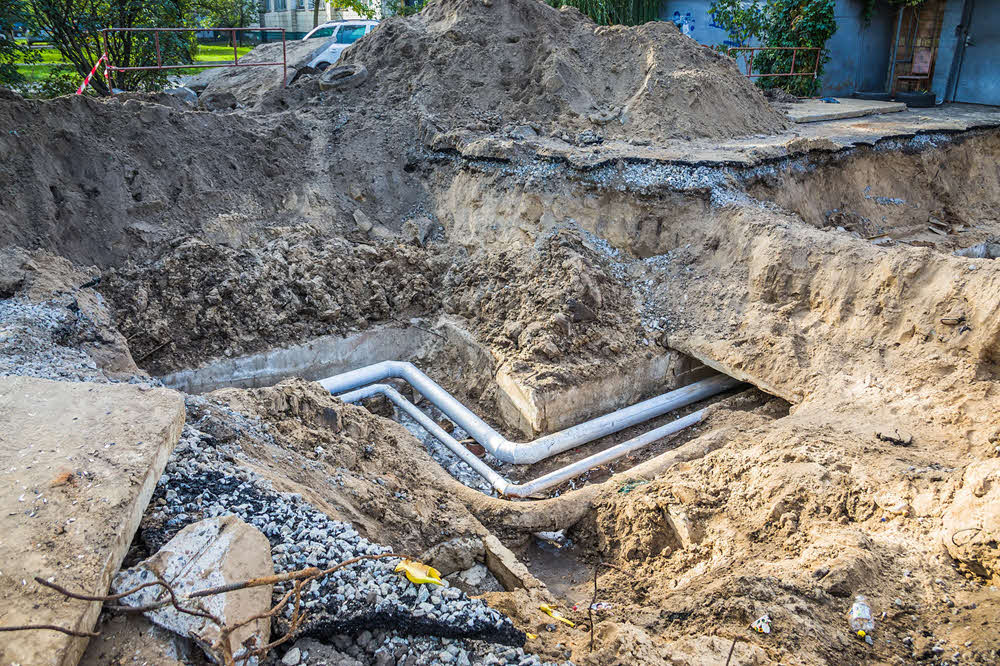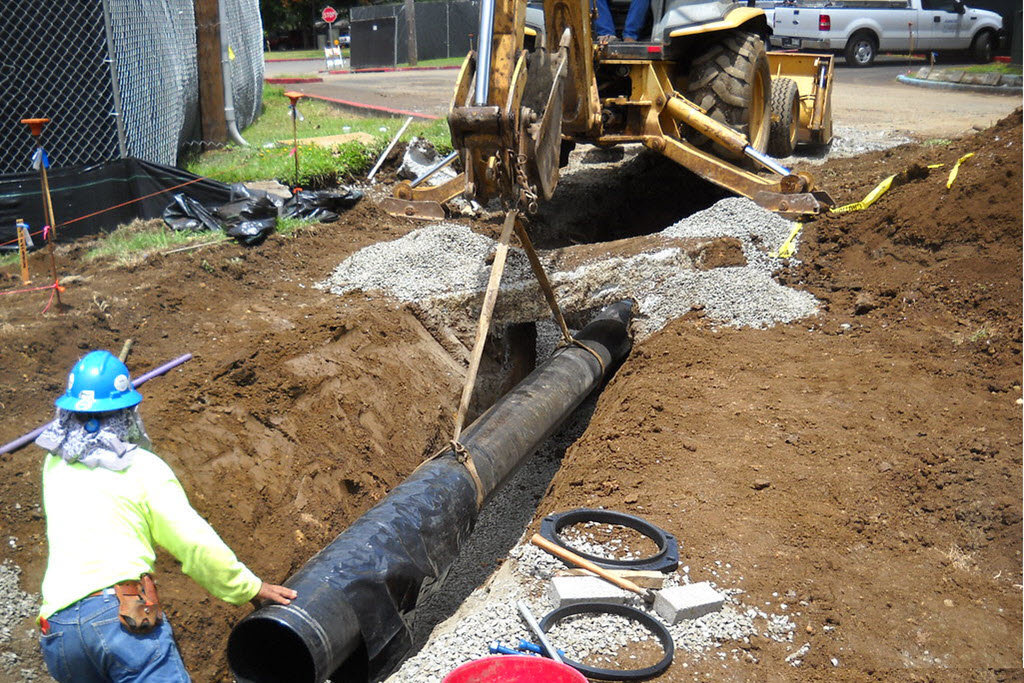Trenching Water Line Servicesin Clinton Township MI
Trenching for Water Lines to Ensure Reliable Water Flow
We Are Locally Owned & Operated For Over 37 Years
Contact Us Today!
We Serve Businesses In And Around The Following Cities:
About Trenching Water Line Services
Introduction: The Essentiality of a Proper Trench For Water Line in Commercial Properties
Running a commercial property in the bustling heartland of Clinton Township requires an intricate blend of proficient infrastructure, careful planning, and prudent investments. Among these, a pivotal though often underestimated aspect, the trench for water line installation, holds substantial importance. Establishing a water service line in your commercial property goes beyond ensuring timely sustenance of water; it also has an indirect impact on your company’s performance through its effects on employee wellness, productivity levels, and the overall functionality.
Through the course of this comprehensive guide, we aim to take you on a journey, emphasizing the process, benefits, and real-world applications of installing a trench for a water line on commercial properties. While delving into the various facets of this much-necessary service, we, thereby, transition smoothly to our first major section.
A Glimpse into the Process of Water Main Installation
Water main installation gets your Clinton Township commercial property the fresh, uncontaminated, and high-quality water it needs for its daily operations. The process involves a certain level of complexity, beginning with creating a trench. This trench, well-aligned with the mains, forms the pathway for laying down the water pipe. Next, it involves connecting your property to the waterline, followed by a backfill to fortify the surroundings, and a patch-up to culminate the job. Professional services like D&J Contracting ensure this process meets all safety standards while catering to the unique needs of your property).
Benefits of Installing a Water Service Line on your Property
Dragging your course through the complexities of running a new water line provides a multitude of direct and indirect benefits to your organization. Think of it as a vein, carrying the lifeblood your business needs to perform and flourish. Primarily, it ensures regular and clean water supply, necessary for any building’s functioning. Moreover, this process can improve your property’s resale value by boosting its infrastructural integrity. Lastly, a proper water line installation reduces the risk of waterborne diseases, thereby propelling employee health and efficiency.
Real-World Examples: The Success Stories
As we meander down the Clinton Township alleys, we come across numerous commercial properties that have leveraged the expertise of professional services like D&J Contracting to install their water service line. Restaurants and cafes, relying on clean water for hygienic food preparation, have seen an uplift in their health safety ratings. Offices with daily water needs for sanitation and drinking purposes have reported an increase in their employee productivity levels and satisfaction rates. Manufacturing units necessitating vast amounts of water for their activities have experienced a significant drop in interruptions, thus stabilizing their output levels. These real-world instances emphasize the profound impact that a well-installed water line can have on a business’s functionality and profitability.
A Final Thought
Without a doubt, the process of installing a water service line involves a confluence of careful planning, recognizing the inherent site conditions, and addressing the unique needs of your establishment. Yet, it’s an investment worth spending on. Those appreciating its worth and emphasizing this service’s requirement have reaped rewarding benefits in Clinton Township’s commercial sector- whether improved hygiene standards, employee productivity, or bolstered infrastructural integrity.
Should you contemplate the prospect of running a new water line on your property, remember, professional teams like D&J Contracting are just a call away. With their array of services and experienced professionals, they ensure your commercial property meets its water needs proficiently and efficiently, assisting you every step of the way. Trust the process, reap the rewards and make your commercial property an epitome of efficient infrastructure and proficient functionality. Bridge the gap between necessity and realization, starting with the trench for the water line on your Clinton Township commercial property.
Trenching Water Line Services Gallery


Call Us Today to receive your Free Quote for
Trench For Water Line in Clinton Township
Serving: Clinton Township, Michigan

About Clinton Township, Michigan
The first settlement on the land that is now Clinton Township was called Gnadenhuetten and was established in 1782 by Rev. David Zeisberger, but closed in 1786. It was organized as “Huron Township” on August 12, 1818, named after what was then known as the Huron River. Because of confusion with another Huron River south of Detroit, on July 17, 1824, the Michigan Territorial Legislature renamed both the township and the river after DeWitt Clinton, the popular governor of New York from 1817 to 1823 who was largely responsible for building the Erie Canal which enabled many settlers to come to Michigan.
Moravian Drive is the township’s oldest road, dating back to the days when Moravian missionaries settled to attempt to convert the local Native Americans.
Clinton Township is in south-central Macomb County. The city of Mount Clemens, the Macomb county seat, is bordered on three sides by the northeast part of the township.
According to the United States Census Bureau, Clinton Township has a total area of 28.37 square miles (73.5 km), of which 28.03 square miles (72.6 km) are land and 0.35 square miles (0.91 km), or 1.22%, are water. The Clinton River, for which the community is named, is formed from three branches within the township. It runs east into Harrison Township, where it flows into Lake St. Clair. The township is home to many parks, notably George George Memorial Park.
There are two unincorporated communities in the township:
- Broad Acres is located in the southeastern portion on M-3/Gratiot Avenue between 15 Mile and Quinn Roads (42°32′57″N 82°54′08″W / 42.54917°N 82.90222°W; Elevation: 610 ft./186 m.).
- Cady is located in the southwestern portion at Utica and Moravian Roads (42°33′37″N 82°57′52″W / 42.56028°N 82.96444°W; Elevation: 614 ft./187 m.). It was founded in 1833 by Chauncey G. Cady. Cady served for a time as township supervisor and was also a member of the state legislature. It had a post office from 1864 until 1906.
| Census | Pop. | Note | %± |
|---|---|---|---|
| 2000 | 95,648 | — | |
| 2010 | 96,796 | 1.2% | |
| 2020 | 100,513 | 3.8% | |
| 2023 (est.) | 99,377 | −1.1% | |
| U.S. Decennial Census | |||
| Race / Ethnicity (NH = Non-Hispanic) | Pop 2000 | Pop 2010 | Pop 2020 | % 2000 | % 2010 | % 2020 |
|---|---|---|---|---|---|---|
| White alone (NH) | 86,042 | 78,062 | 72,926 | 89.96% | 80.65% | 72.55% |
| Black or African American alone (NH) | 4,424 | 12,509 | 17,428 | 4.63% | 12.92% | 17.34% |
| Native American or Alaska Native alone (NH) | 223 | 230 | 192 | 0.23% | 0.24% | 0.19% |
| Asian alone (NH) | 1,597 | 1,723 | 2,170 | 1.67% | 1.78% | 2.16% |
| Pacific Islander alone (NH) | 11 | 29 | 19 | 0.01% | 0.03% | 0.02% |
| Other race alone (NH) | 82 | 82 | 335 | 0.09% | 0.08% | 0.33% |
| Mixed race or Multiracial (NH) | 1,605 | 1,871 | 4,449 | 1.68% | 1.93% | 4.43% |
| Hispanic or Latino (any race) | 1,664 | 2,290 | 2,994 | 1.74% | 2.37% | 2.98% |
| Total | 95,648 | 96,796 | 100,513 | 100.00% | 100.00% | 100.00% |
As of the census of 2010, there were 96,796 people, 42,036 households, and 25,678 families residing in the township. The racial makeup of the township was 82.08% White, 13.04% African American, 0.28% Native American, 1.79% Asian, 0.03% Pacific Islander, 0.61% from other races, and 2.17% from two or more races. Hispanic or Latino people of any race were 2.37% of the population. By 2016, the township’s population was estimated to have surpassed 100,000.
In 2000, there were 40,299 households, out of which 28.1% had children under the age of 18 living with them, 48.7% were married couples living together, 10.9% had a female householder with no husband present, and 36.6% were non-families. 30.8% of all households were made up of individuals, and 10.8% had someone living alone who was 65 years of age or older. The average household size was 2.35 and the average family size was 2.98.
In 2000, 22.4% of the population was under the age of 18, 9.1% from 18 to 24, 30.9% from 25 to 44, 23.4% from 45 to 64, and 14.3% who were 65 years of age or older. The median age was 37 years. For every 100 females, there were 92.4 males. For every 100 females age 18 and over, there were 88.5 males. The median income for a household in the township was $50,067, and the median income for a family was $61,497. Males had a median income of $48,818 versus $29,847 for females. The per capita income for the township was $25,758. About 4.2% of families and 5.8% of the population were below the poverty line, including 7.4% of those under age 18 and 6.8% of those age 65 or over.
Chippewa Valley Schools, with two high schools (Chippewa Valley and Dakota), and Clintondale Community Schools, with one high school (Clintondale High), are the primary school districts in the township. Other school districts that operate within Clinton Township are L’Anse Creuse, Fraser, and Mount Clemens.
Call Us Today to receive your Free Quote for
Trench For Water Line in Clinton Township
Related Services in Clinton Township, Michigan
We Serve Businesses In The Following Zip Codes:
48007, 48015, 48021, 48026, 48035, 48036, 48038, 48042, 48043, 48044, 48045, 48046, 48047, 48048, 48050, 48051, 48066, 48071, 48080, 48081, 48082, 48083, 48084, 48085, 48088, 48089, 48090, 48091, 48092, 48093, 48098, 48099, 48225, 48230, 48236, 48310, 48311, 48312, 48313, 48314, 48315, 48316, 48317, 48318, 48397